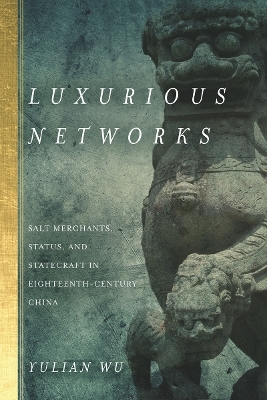
Luxurious Networks
Stanford University Press (Verlag)
978-0-8047-9811-2 (ISBN)
Luxurious Networks examines Huizhou salt merchants in the material world of High Qing China to reveal a dynamic interaction between people and objects. The Qianlong emperor purposely used objects to expand his influence in economic and cultural fields. Thanks to their broad networks, outstanding managerial skills, and abundant financial resources, these salt merchants were ideal agents for selecting and producing objects for imperial use. In contrast to the typical caricature of merchants as mimics of the literati, these wealthy businessmen became respected individuals who played a crucial role in the political, economic, social, and cultural world of eighteenth-century China. Their life experiences illustrate the dynamic relationship between the Manchu and Han, central and local, and humans and objects in Chinese history.
Yulian Wu is Assistant Professor of History at the University of South Carolina.
Contents and AbstractsIntroduction: Merchant culture in the Material World of Eighteenth-Century China chapter abstractThe introduction presents the Huizhou salt merchants, with emphasis on the unprecedented economic and political privileges they enjoyed in High Qing China. The author challenges the conventional analysis focused on merchant-literati status negotiations, arguing that this framework is based upon written texts produced by the literati themselves, and is hence not reflective of the merchants' own concerns. By reviewing the extant literary descriptions of Huizhou salt merchants, the author proposes to explore their own voices and opinions by analyzing their interactions with material objects. This indicates the emergence of a novel and vital network between the Qianlong emperor, the imperial household department, court officials, and Huizhou salt merchants, constructed between the capital Beijing, the urban centers of Jiangnan, and the remote countryside of Huizhou. A focus on these salt merchants sheds new light on Manchu emperors' political strategies and reveals merchants' role in luxury consumption in High Qing China.
1Courting the Court chapter abstractthis chapter sets the scene for this study, examining the historical and political reasons for the Huizhou salt merchants' rise and their connection with the court during the High Qing period. It explains how the Manchu court reformed existing salt monopoly policies by appointing the emperors' bondservants as salt bureau officials and by establishing the new position of head merchant. These two policies injected the Manchu emperors' own networks into the salt monopoly institution and allowed the court to effectively exert influence on the wealthiest commercial centers of the Lower Yangzi area. The Huizhou salt merchants, on the other hand, created new and direct ties with the court by obtaining head merchant positions. These merchants thus achieved unprecedented economic and political privileges that took advantage of the Manchu court's own ethnic strategies.
2Furnishing the Court chapter abstractChapter 2 examines the Huizhou head merchants' interaction with the most precious and expensive goods in eighteenth-century Jiangnan. It explores how these businessmen produced and procured objects for imperial use through the tribute system, manufacturing, and the Qianlong emperor's empire-wide book collecting project. This chapter shows in detail how the Huizhou salt merchants procured objects from local workshops, markets, and private collections and how their personal networks and managerial ability enabled them to "run errands" for the court. While the salt merchants supplemented formal state bureaucratic systems and served as the emperor's informal agents in Jiangnan, they also facilitated an exchange of style and taste between the capital and Jiangnan.
3Collecting as a "Collector" chapter abstractThis chapter discusses merchants' roles in collecting culture during the High Qing period through a study of the salt merchant Wang Qishu and his collection of seals. The Qianlong emperor's personal interest in collecting and his compilation of a large series of court-sponsored catalogues led to a recognition of collectors in Qing society. Collectors (shoucangjia) emerged as a unique social category, and collecting came to be seen as a valued form of expertise. By locating Wang Qishu's case in this High Qing context, the author examines how Wang used different elements associated with his seal collection to assert himself as a collector. Wang's contemporaries also saw him as a collector passionate about seals, as an expert in seal connoisseurship, and as financially capable of amassing a distinguished collection. Through his collection, Wang assumed the role of "collector"—a new social status symbol—and thereby legitimized his position in society.
4Luxury and Lineage chapter abstractThis chapter takes the case of the Bao family from Tangyue village to explore the ways in which salt merchants patronized lineage construction projects as a means to expand the influences of their families in the countryside of Huizhou and to strengthen a connection with urban scholarly elites. By tracing the construction process of three lineage projects sponsored by the Bao household—the publishing of a new genealogy, the construction of a shrine, and the donation of charitable lands—the author shows how the Bao merchants patronized specific lineage construction projects, which functioned as luxury items sanctioned by Confucian moral example. Through these cultural objects, the Bao family expanded their influence in their rural homeland in Huizhou, and displayed their moral values for the benefit of scholarly elites in the court and Jiangnan urban centers, creating connections between the countryside and the city, and the central and local.
5Materializing Morality chapter abstractThis chapter examines the salt merchants' role in constructing chastity arches—stone structures honoring women who maintained chaste widowhood—in She county in Huizhou. In the High Qing era, the Manchu court systematically patronized the construction of monumental objects, such as stone arches, with the dual object of inculcating Confucian morality in their illiterate subjects and displaying their imperial legitimacy. The Huizhou salt merchants, seeing an opportunity to expand their influence, devoted themselves to chastity arch construction in the local community of Huizhou, thus publicizing the virtuous deeds that the court rewarded. While these merchants used their economic prowess to participate in the state's cultivation project, their financial support of these arches was itself a product of the court's salt monopoly policies. At the same time, these monuments gave these wealthy businessmen the opportunity to bolster their reputations, display their wealth, and lay claim to legitimate dominance in local society.
Conclusion: Cultured and Cosmopolitan Men (tongren): Objects, Merchants, and the Manchu Court in High Qing China chapter abstractThe conclusion argues that the Huizhou salt merchants emerged as "cultured and cosmopolitan men" who distinguished themselves with knowledge and skill in a wide range of fields, being famed for their managerial prowess. Through their production and consumption of a variety of objects, these merchants played multiple roles in the fluid material world of High Qing China, whether as the emperor's informal agents or arbiters of taste, lineage patrons or moral advocates. By playing these roles, these salt merchants also constructed a dynamic and fluid urban-rural and central-local relationship in the high Qing period. Study of these salt merchants thus sheds new light on the Qianlong emperor's political strategy in Jiangnan and reveals the differences and transformations of consumer cultures in China from the late Ming to the high Qing.
| Erscheinungsdatum | 31.12.2016 |
|---|---|
| Zusatzinfo | 1 figure, 18 halftones, 2 tables, 3 maps |
| Verlagsort | Palo Alto |
| Sprache | englisch |
| Maße | 152 x 229 mm |
| Themenwelt | Kunst / Musik / Theater ► Kunstgeschichte / Kunststile |
| Geschichte ► Allgemeine Geschichte ► Neuzeit (bis 1918) | |
| Geisteswissenschaften ► Geschichte ► Regional- / Ländergeschichte | |
| Geschichte ► Teilgebiete der Geschichte ► Kulturgeschichte | |
| Geschichte ► Teilgebiete der Geschichte ► Wirtschaftsgeschichte | |
| Wirtschaft ► Volkswirtschaftslehre ► Mikroökonomie | |
| ISBN-10 | 0-8047-9811-7 / 0804798117 |
| ISBN-13 | 978-0-8047-9811-2 / 9780804798112 |
| Zustand | Neuware |
| Informationen gemäß Produktsicherheitsverordnung (GPSR) | |
| Haben Sie eine Frage zum Produkt? |
aus dem Bereich


